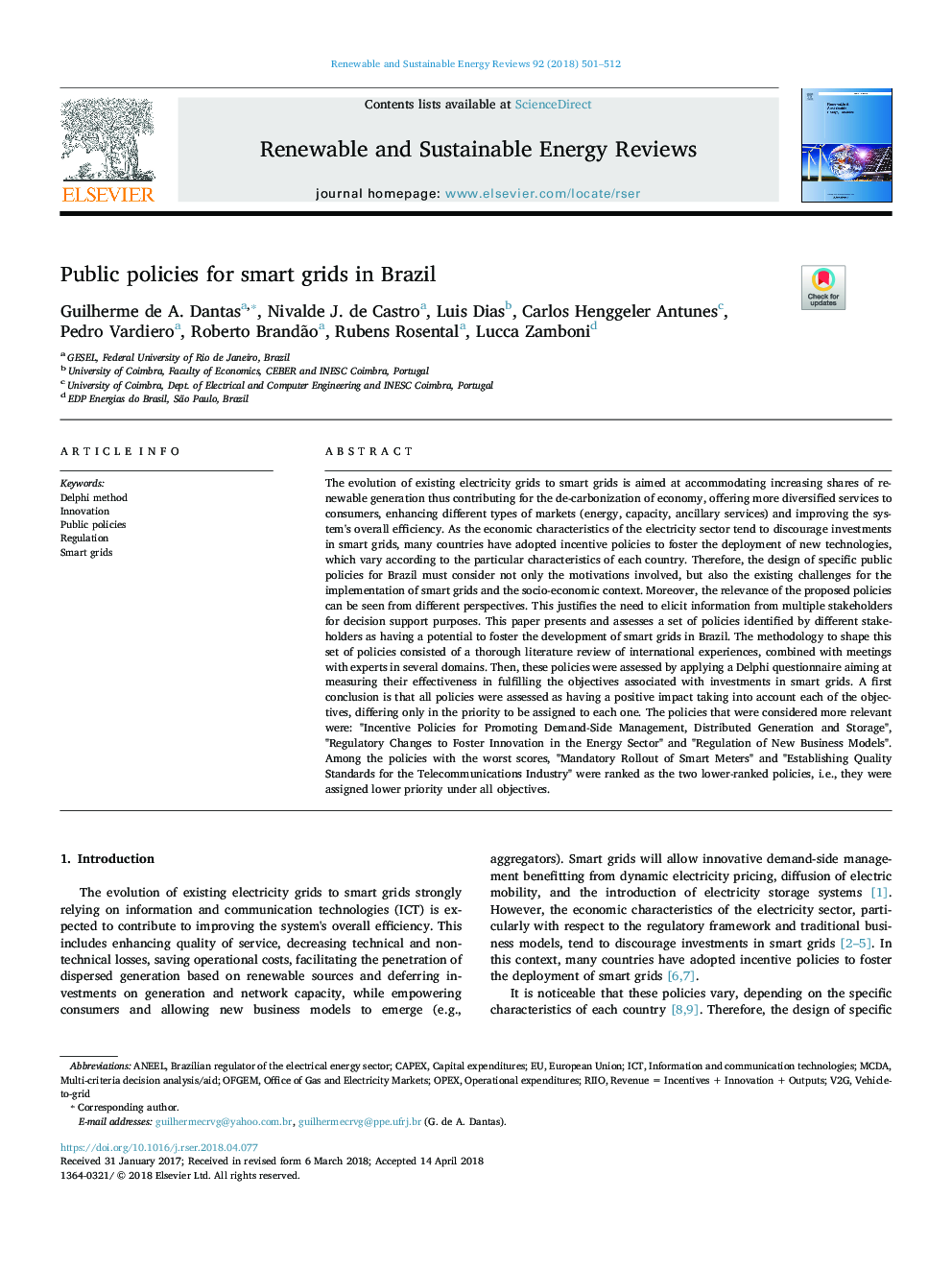| کد مقاله | کد نشریه | سال انتشار | مقاله انگلیسی | نسخه تمام متن |
|---|---|---|---|---|
| 8110924 | 1522292 | 2018 | 12 صفحه PDF | دانلود رایگان |
عنوان انگلیسی مقاله ISI
Public policies for smart grids in Brazil
ترجمه فارسی عنوان
سیاست های عمومی شبکه های هوشمند در برزیل
دانلود مقاله + سفارش ترجمه
دانلود مقاله ISI انگلیسی
رایگان برای ایرانیان
کلمات کلیدی
ANEELCAPEXOffice of Gas and Electricity MarketsMCDAOPEXV2GEuropean Union - اتحادیه اروپاVehicle-to-grid - خودرو به شبکهDelphi method - روش دلفیPublic policies - سیاست های عمومیSmart Grids - شبکه های هوشمندOfgem - فرگمInformation and communication technologies - فن آوری اطلاعات و ارتباطاتICT - فناوری اطلاعات و ارتباطات Regulation - مقرراتInnovation - نوآوریcapital expenditures - هزینه های سرمایهOperational expenditures - هزینه های عملیاتی
ترجمه چکیده
تکامل شبکه های برق موجود به شبکه های هوشمند با هدف تطبیق افزایش بخشیدن به تولید نسل های تجدید پذیر است که به این ترتیب کمک به انحلال اقتصاد، ارائه خدمات متنوع تر به مصرف کنندگان، افزایش انواع مختلف بازار (انرژی، ظرفیت، خدمات جانبی) و بهبود بهره وری کلی سیستم. به عنوان ویژگی های اقتصادی بخش برق تمایل به سرمایه گذاری در شبکه های هوشمند را نادیده می گیرند، بسیاری از کشورها سیاست های انگیزشی را برای توسعه فن آوری های جدید ترغیب می کنند که با توجه به ویژگی های خاص هر کشور متفاوت است. بنابراین، طراحی سیاست های خاص دولتی برای برزیل باید نه تنها انگیزه های درگیر، بلکه چالش های موجود برای اجرای شبکه های هوشمند و زمینه های اجتماعی و اقتصادی را نیز مورد توجه قرار دهد. علاوه بر این، اهمیت سیاست های پیشنهادی را می توان از دیدگاه های مختلف مشاهده کرد. این به توجیه نیاز به استخراج اطلاعات از سهامداران مختلف برای اهداف تصدیق تصمیم گیری است. این مقاله ارائه و ارزیابی مجموعه ای از سیاست های مشخص شده توسط ذینفعان مختلف به عنوان داشتن پتانسیل برای توسعه شبکه های هوشمند در برزیل. روش شناسی برای شکل گیری این مجموعه سیاست ها شامل بررسی ادبی کامل تجربیات بین المللی و جلسات با کارشناسان در حوزه های مختلف بود. سپس، این سیاست ها با استفاده از یک پرسشنامه دلفی با هدف سنجش اثربخشی آنها در انجام اهداف مربوط به سرمایه گذاری در شبکه های هوشمند مورد ارزیابی قرار گرفت. اولین نتیجه گیری این است که همه سیاست ها به عنوان یک تاثیر مثبت محسوب می شوند، هر کدام از اهداف را در نظر بگیرند، تنها در اولویت قرار دارند که به هر یک از آنها اختصاص داده می شود. سیاستهایی که بیشتر مورد توجه قرار گرفتند عبارت بودند از: "الزامات مشوقی برای ترویج مدیریت تقاضا، تولید و ذخیره توزیع شده"، "تغییرات تنظیمی برای ارتقاء نوآوری در بخش انرژی" و "تنظیم مدلهای تجاری جدید". در میان سیاست هایی با بدترین نمرات، "مجاز اجباری دستگاه های هوشمند" و "ایجاد استانداردهای کیفیت برای صنعت مخابرات" به عنوان دو خط پایین رتبه رتبه بندی شد، یعنی اولویت آنها با توجه به اهداف تعیین شده بود.
موضوعات مرتبط
مهندسی و علوم پایه
مهندسی انرژی
انرژی های تجدید پذیر، توسعه پایدار و محیط زیست
چکیده انگلیسی
The evolution of existing electricity grids to smart grids is aimed at accommodating increasing shares of renewable generation thus contributing for the de-carbonization of economy, offering more diversified services to consumers, enhancing different types of markets (energy, capacity, ancillary services) and improving the system's overall efficiency. As the economic characteristics of the electricity sector tend to discourage investments in smart grids, many countries have adopted incentive policies to foster the deployment of new technologies, which vary according to the particular characteristics of each country. Therefore, the design of specific public policies for Brazil must consider not only the motivations involved, but also the existing challenges for the implementation of smart grids and the socio-economic context. Moreover, the relevance of the proposed policies can be seen from different perspectives. This justifies the need to elicit information from multiple stakeholders for decision support purposes. This paper presents and assesses a set of policies identified by different stakeholders as having a potential to foster the development of smart grids in Brazil. The methodology to shape this set of policies consisted of a thorough literature review of international experiences, combined with meetings with experts in several domains. Then, these policies were assessed by applying a Delphi questionnaire aiming at measuring their effectiveness in fulfilling the objectives associated with investments in smart grids. A first conclusion is that all policies were assessed as having a positive impact taking into account each of the objectives, differing only in the priority to be assigned to each one. The policies that were considered more relevant were: "Incentive Policies for Promoting Demand-Side Management, Distributed Generation and Storage", "Regulatory Changes to Foster Innovation in the Energy Sector" and "Regulation of New Business Models". Among the policies with the worst scores, "Mandatory Rollout of Smart Meters" and "Establishing Quality Standards for the Telecommunications Industry" were ranked as the two lower-ranked policies, i.e., they were assigned lower priority under all objectives.
ناشر
Database: Elsevier - ScienceDirect (ساینس دایرکت)
Journal: Renewable and Sustainable Energy Reviews - Volume 92, September 2018, Pages 501-512
Journal: Renewable and Sustainable Energy Reviews - Volume 92, September 2018, Pages 501-512
نویسندگان
Guilherme de A. Dantas, Nivalde J. de Castro, Luis Dias, Carlos Henggeler Antunes, Pedro Vardiero, Roberto Brandão, Rubens Rosental, Lucca Zamboni,
